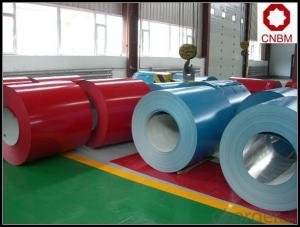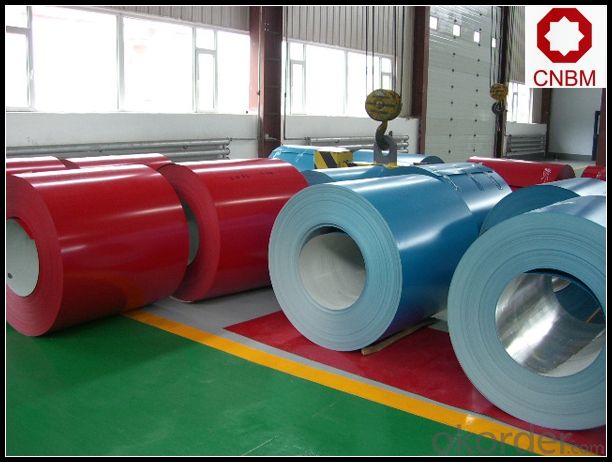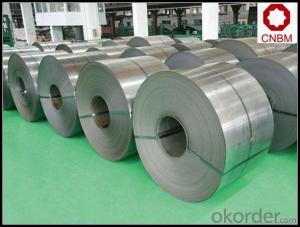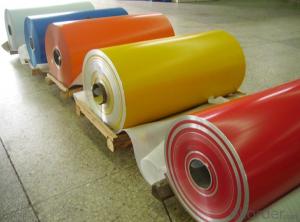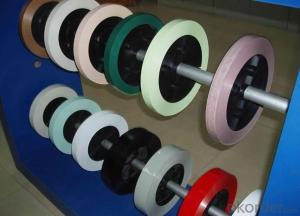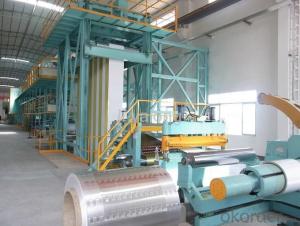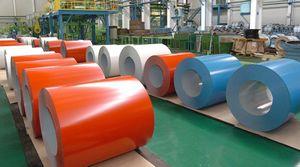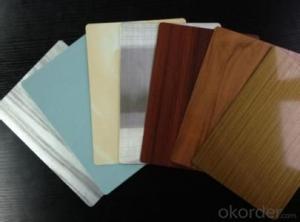Fin Tube Aluminum Coils PE/PVDF Color Coated Aluminum Coil 0.6mm 3003 3105 5052
- Loading Port:
- Shanghai
- Payment Terms:
- TT OR LC
- Min Order Qty:
- 5 m.t.
- Supply Capability:
- 10000 m.t./month
OKorder Service Pledge
OKorder Financial Service
You Might Also Like
Specification
1. Specification of PE/PVDF Color Coated Aluminum Coil 0.6mm 3003 3105 5052
Alloy: 1050, 1060, 1100, 3003, 3004, 3005, 3105, 5005, 5052, 5083, 5754
2) Temper: Various status
3) Thickness: 0.3-150mm
4) Width: 300-1950mm
5) Length: Under9500mm/ Coil
6) Weight: 2.5-5.0 tons per coil
7) Dimensions and weight can be produced according to clients' specifications.
8) Inner Diameter: 505mm, 605mm
9) Packing: Export standard, wooden pallet.
10) Delivery time: 20 days
11) Minimum order quantity: 5 tons per size.
12) The term of payment: T/T, irrevocable L/C at sight.
13) Surface: Bright
14)Origin: China
2. Application of PE/PVDF Color Coated Aluminum Coil 0.6mm 3003 3105 5052
(1).Interior: wall cladding, ceilings, bathrooms, kitchens and balconies, shutters, doors...
(2).Exterior: wall cladding, facades, roofing, canopies, tunnels,column covers , renovations...
(3).Advertisement: display platforms, signboards, fascia, shop fronts...
3. Feature of PE/PVDF Color Coated Aluminum Coil 0.6mm 3003 3105 5052
*Such coil is specially designed to replace aluminum ingot, due to the high export tax of aluminum ingot, the coil has better price than ingot.
*This type of coil can fit customer's remelting furnace just like ingot, no need to make any change to the production line that was previously used for ingot. The standard coil size and weight is very suitable for the feed gate of furnace.
*This type of coil causes less material wastage than ingot when remelted.
*Our coil is made directly from ore, no need to go though the ingot making process, quality is much better than other suppliers who use ingot scrap to make coil.
Be free from Oil Stain, Dent, Inclusion, Scratches, Stain, Oxide Dicoloration, Breaks, Corrosion, Roll Marks, Dirt Streaks and other defect which will interfere with use
4. Certificate:
SGS and ROHS(if client request, paid by client), MTC(plant provided), Certificate of Origin(FORM A, FORM E, CO), Bureau Veritas and SGS (if client request, paid by client), CIQS certificate
5. Image of PE/PVDF Color Coated Aluminum Coil 0.6mm 3003 3105 5052
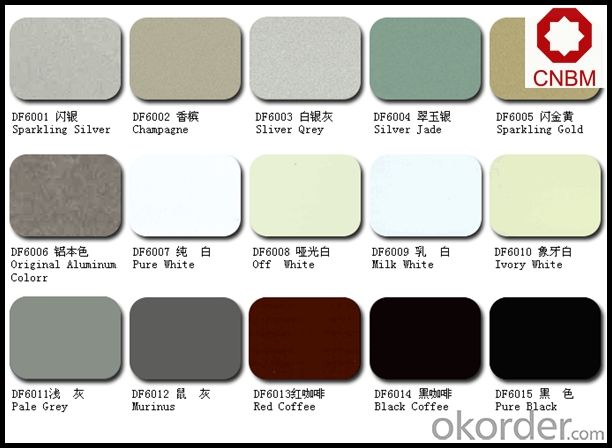
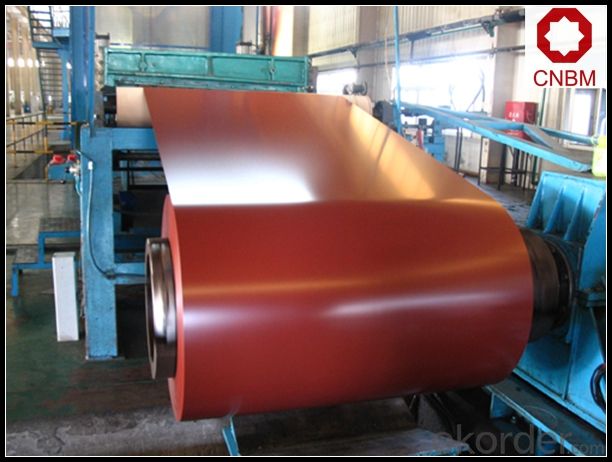
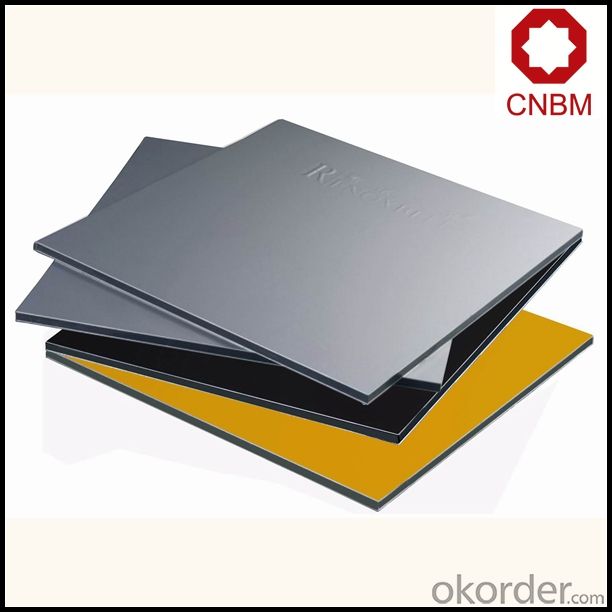
6. Package and shipping of PE/PVDF Color Coated Aluminum Coil 0.6mm 3003 3105 5052
eye to wall
eye to the wall
with wood pallet (wooded case also available)
7. FAQ
1) What is the delivery time?
Dpends on actual order, around 20 to 35 days
2)What is the QC system:
We have QC staff of 20 persons and advanced equipment, each production is with MTC traced from Aluminum ingot lot.
3) What market do you mainly sell to?
Australia, America, Asia, Middle East, Western Europe, Africa etc
- Q: What is the weight of aluminum coils per square foot?
- The weight of aluminum coils per square foot can vary depending on the thickness of the coil. On average, aluminum coils weigh around 0.5 pounds per square foot. However, it is important to note that this is an approximate figure and may vary slightly depending on the specific alloy and manufacturing process used. It is always recommended to consult the manufacturer or supplier for the exact weight specifications of the aluminum coils you are working with.
- Q: If so why does an aluminum bend or get nicked or break quickly?
- It depends on how you set the criteria of comparison. If you go by volume, Aluminum isn't stronger. That's why a steel can is stronger than one of similar size and thickness. If you go by weight, aluminum is said to be stronger. Let's say we were looking to create a wall, spec'ed to a particular height and width, and just thick enough to hold back a given PSI of pressure. The aluminum one would have to be thicker to have the strength to hold back the pressure, but it'd be lighter than the steel equivalent. Also, the ease by which a material can be nicked isn't an indicator of strength but of hardness. Harder, isn't necessarily stronger.
- Q: Can aluminum coils be used in solar energy systems?
- Certainly, solar energy systems can utilize aluminum coils. Aluminum is widely employed in the fabrication of solar panels and solar energy systems owing to its remarkable qualities. Lightweight, durable, and possessing excellent thermal conductivity, aluminum coils are perfect for dispersing heat away from solar cells. Moreover, aluminum's resistance to corrosion is essential for outdoor deployments, where solar panels face diverse weather conditions. By incorporating aluminum coils into solar energy systems, the efficiency and lifespan of the panels are enhanced, thus augmenting the efficacy and sustainability of solar energy generation.
- Q: What are the different types of surface coatings for aluminum coils?
- Aluminum coils can be treated with various surface coatings, each serving different purposes. These coatings safeguard the aluminum against corrosion, improve its appearance, and enhance its durability. The most common surface coatings for aluminum coils are as follows: 1. Polyester: Polyester coatings are widely favored for their ability to retain color and resist fading. They provide a smooth, glossy finish and are commonly employed in architectural applications. 2. Polyvinylidene Fluoride (PVDF): PVDF coatings are highly durable and weather resistant. They exhibit exceptional resistance to UV radiation, chemicals, and abrasion, making them suitable for outdoor use and harsh environments. 3. Epoxy: Epoxy coatings possess good adhesion and chemical resistance. They find frequent application in industrial settings where corrosion protection is vital, such as chemical processing plants and marine environments. 4. Polyurethane: Polyurethane coatings are renowned for their durability and resistance to abrasion. They are often utilized in high-traffic areas or applications where the aluminum surface is subject to frequent contact or wear. 5. Acrylic: Acrylic coatings offer reliable weather resistance and color retention. They provide a smooth, glossy finish and are commonly used in architectural and decorative applications. 6. Plastisol: Plastisol coatings, a type of vinyl coating, exhibit excellent corrosion resistance and flexibility. They are frequently employed in applications where the aluminum surface must withstand bending or forming without cracking or peeling. It is essential to consider that each coating type has its own unique properties and advantages. The selection of the coating will depend on specific application requirements, including the desired level of corrosion resistance, aesthetic preferences, and environmental conditions.
- Q: What are the regulations and standards governing the production of aluminum coils?
- Various regulations and standards are in place to govern the production of aluminum coils, ensuring product quality, safety, and environmental sustainability. These regulations may vary depending on the country or region, but there are common industry standards that are widely recognized. One primary regulation that governs the production of aluminum coils relates to product quality and specifications. Organizations such as the American Society for Testing and Materials (ASTM) or the International Organization for Standardization (ISO) set specific standards that aluminum coils must meet. These standards define the physical and chemical properties that the coils must possess, such as thickness, width, tensile strength, and chemical composition. Safety regulations are also in place to protect workers and facilities involved in the production process. For example, the Occupational Safety and Health Administration (OSHA) outlines safety measures and requirements to prevent accidents and ensure safe working conditions. This includes guidelines for handling and storing aluminum coils, personal protective equipment requirements, and emergency response protocols. The production of aluminum coils is also subject to environmental regulations that aim to minimize its impact on the environment and promote sustainable practices. These regulations may include guidelines for waste treatment and disposal, the use of energy-efficient equipment, and the reduction of greenhouse gas emissions. Industry-specific organizations, such as the Aluminum Association in the United States or the European Aluminium Association in Europe, also establish voluntary standards and best practices for aluminum coil production. They collaborate with manufacturers to develop guidelines for quality control, sustainability, and continuous improvement in the industry. Overall, compliance with these regulations and standards ensures the production of high-quality aluminum coils that meet customer requirements and contribute to a sustainable and responsible industry.
- Q: Can aluminum coils be used for outdoor applications?
- Indeed, outdoor applications can utilize aluminum coils. Aluminum, as a material, possesses outstanding versatility and durability, enabling it to endure diverse weather conditions and temperatures. Its resistance to corrosion renders it suitable for outdoor environments that encounter moisture and humidity. Moreover, aluminum coils boast a lightweight characteristic, facilitating their transportation and installation within outdoor settings. Consequently, they find frequent usage in outdoor applications encompassing roofing, siding, gutters, and HVAC systems. Taken together, the strength, corrosion resistance, and longevity of aluminum coils establish them as a dependable option for outdoor applications.
- Q: Can aluminum coils be used in heat sinks?
- Yes, aluminum coils can be used in heat sinks. Aluminum is a popular choice for heat sinks due to its excellent thermal conductivity. Heat sinks are designed to dissipate heat from electronic components and other devices to prevent overheating. The use of aluminum coils in heat sinks allows for increased surface area, which enhances heat dissipation. The coils can be shaped and arranged in various configurations to optimize cooling efficiency. Additionally, aluminum is lightweight, corrosion-resistant, and cost-effective, making it a practical choice for heat sink applications.
- Q: What types of aluminum coil are best suited for specific applications?
- <p>Yes, different types of aluminum coil are better suited for specific applications. For instance, 1100 series aluminum coil, known for its high purity and excellent formability, is ideal for applications requiring deep drawing or bending. The 3003 series is often used for applications needing good corrosion resistance and formability, such as automotive parts and chemical equipment. The 5052 series offers a balance of strength and corrosion resistance, making it suitable for marine applications and aircraft structures. The 6061 series is known for its strength and is often used in construction and transportation industries. Each series has unique properties that make it more suitable for certain applications, so selection should be based on the specific requirements of the project.</p>
- Q: What are the common cleaning and maintenance products for aluminum coils?
- Aluminum coils can be cleaned and maintained using various products. One popular option is a mild detergent mixed with water. This mixture can be applied to the coils using a soft brush or cloth, and then rinsed off with water. Another commonly used product is a coil cleaner specifically designed for aluminum surfaces. These cleaners are usually available in spray or foam form and effectively remove dirt, grease, and oxidation from the coils. It is important to carefully follow the manufacturer's instructions when using these cleaners. Additionally, a mixture of white vinegar and water can be used to clean aluminum coils. This natural cleaning solution effectively removes mineral deposits and stains. It can be applied with a cloth or sponge and then rinsed off with water. Regular maintenance of aluminum coils also includes using a coil coating or sealant. These products create a protective layer on the coils, preventing corrosion and extending their lifespan. It is advisable to apply the coating or sealant according to the manufacturer's instructions. When cleaning and maintaining aluminum coils, it is crucial to avoid using abrasive cleaners, bleach, or harsh chemicals as they can damage the coils. If uncertain about the appropriate cleaning and maintenance products for specific aluminum coils, it is recommended to consult the manufacturer's guidelines or seek professional advice.
- Q: Are aluminum coils suitable for signage and advertising applications?
- Yes, aluminum coils are suitable for signage and advertising applications. Aluminum is a durable and lightweight material, making it ideal for outdoor signage as it can withstand various weather conditions. It also offers a sleek and professional appearance, allowing for high-quality graphics and branding to be displayed. Additionally, aluminum is highly customizable, easy to work with, and has good resistance to corrosion, making it a popular choice for signage and advertising purposes.
Send your message to us
Fin Tube Aluminum Coils PE/PVDF Color Coated Aluminum Coil 0.6mm 3003 3105 5052
- Loading Port:
- Shanghai
- Payment Terms:
- TT OR LC
- Min Order Qty:
- 5 m.t.
- Supply Capability:
- 10000 m.t./month
OKorder Service Pledge
OKorder Financial Service
Similar products
Hot products
Hot Searches
Related keywords
